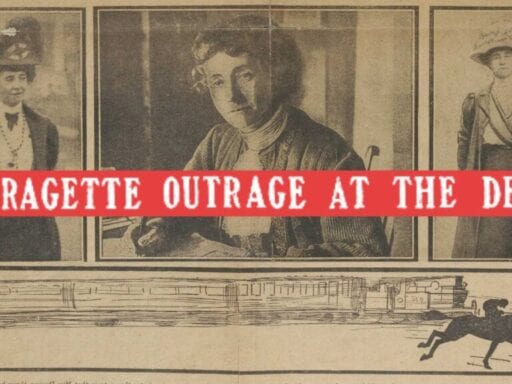In 1913, suffragette Emily Davison disrupted a major horse race in the name of winning British women the vote.
British suffragettes in the early 20th century used spectacle and drama to draw attention to their fight to win women the vote. They delivered public speeches, marched, displayed colorful banners, and got thrown in jail, all in an effort to pressure legislators to extend suffrage to women.
But after a violent clash with police in November 1910 — a day known as “Black Friday” — their tactics changed. They began committing random acts of property damage, smashing windows, setting fire to buildings, and even destroying fine art on public display.
The most radical act of destruction came in 1913, when militant suffragette Emily Wilding Davison threw herself under King George V’s racehorse at the Epsom Derby. She died of her injuries and became a suffragette martyr.
Davison’s funeral procession ultimately ended up being one of the largest (and last) major demonstrations by the British suffragettes. World War I interrupted their protests, and women over 30 won the vote in 1918, when the war ended.
Watch the video above to learn more about the suffragette movement. You can find this video and all of Vox’s videos on YouTube. And if you’re interested in supporting our video journalism, you can become a member of the Vox Video Lab on YouTube.
If you or someone you know is considering self-harm, please seek help through the National Suicide Prevention Lifeline at 1-800-273-8255.
Support Vox’s explanatory journalism
Every day at Vox, we aim to answer your most important questions and provide you, and our audience around the world, with information that has the power to save lives. Our mission has never been more vital than it is in this moment: to empower you through understanding. Vox’s work is reaching more people than ever, but our distinctive brand of explanatory journalism takes resources — particularly during a pandemic and an economic downturn. Your financial contribution will not constitute a donation, but it will enable our staff to continue to offer free articles, videos, and podcasts at the quality and volume that this moment requires. Please consider making a contribution to Vox today.
Author: Coleman Lowndes
Read More



